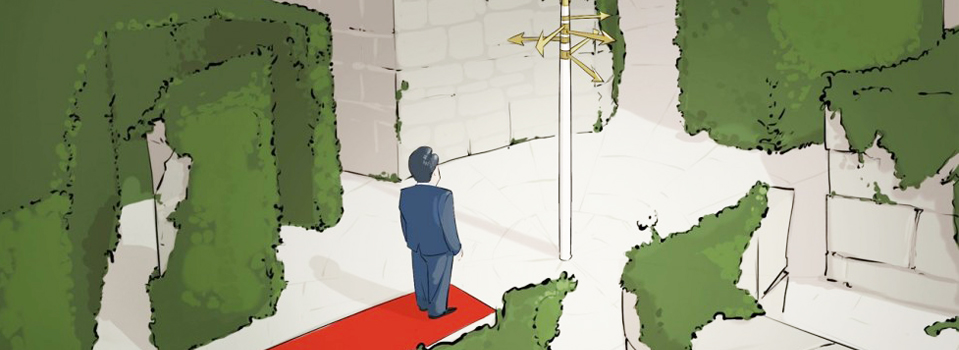IF XI JINPING WANTS CHINA TO SUCCEED THE US AS A WORLD SUPERPOWER, HE MUST CHOOSE CHANGE.

The best that can be said about 2017 is that it has survived both US President Donald Trump and North Korean dictator Kim Jong-un. What happens next year will depend on the Chinese leader, Xi Jinping. The years from then on are China’s to lose.
Trump’s first year in the Oval Office did not ignite a world war, but unleashed the insurgent energies of US parochialism. The most powerful country on earth withdrew from the Trans-Pacific Partnership and the Paris accord on climate change. Multilateralism in trade and environmental solidarity – the mainstays of globalism – were struck off the agenda of American leadership.
In their place appeared the spectre of American exceptionalism, exhibited in part in a visceral distrust of Muslims. Trump’s recognition of Jerusalem as Israel’s capital, and his decision to move the US embassy from Tel Aviv to the historically contested Jerusalem, signalled a dangerous break with the status quo. America has become a revisionist country.
Its peer is North Korea. Pyongyang’s nuclear and missile programmes, carried out in the face of a perceived threat of annihilation by its enemies, announced the arrival of another revisionist nation.
Kim’s desire is to ensure regime survival, to avoid the fate of Iraq and Libya, whose governments were demolished as part of a US crusade for regime change in the Middle East. Signature regimes in these countries lacked a nuclear deterrent. North Korea wishes to avoid that fate by threatening South Korea, Japan and America itself with nuclear retaliation, should they move against its political system.
In this struggle between a nuclear David and a nuclear Goliath, China – itself nuclear, of course – appears as an agnostic interlocutor. It has achieved already a measure of destructive ability that makes it a nuclear companion of the United States, although not an equal. It has also kept open channels of meaningful communication with the regime in Pyongyang.
China has assured North Korea that it will not sell it down the river to bolster its own relations with America. This is because Washington – and not Pyongyang (nor Tokyo, Seoul or New Delhi) – remains the chief obstacle to China’s rise to world greatness. Having sought to inherit the mantle of the world’s next superpower, China will have to wear it comfortably. It is not certain that it can do so.
In a 1981 lecture, Sir Harry Hinsley, the Cambridge scholar of international relations, argued that “international conduct in the past 200 years has differed from international conduct in all earlier times, when states were more or less continuously engaged in wars that remained limited in scale – and so much so that the rise of the modern system may safely be traced back to the end of the 18th century”.
The challenge is to preserve the world’s newfound capacity for peace following the end of the cold war and the changed global distribution of power, which is creating a fresh balance of power among leading countries. Whether peace will prevail and, if so, what shape it will take will depend to a great extent on how China perceives its future.
If China reverts to a Middle Kingdom complex, it will have to create a world order that suits its needs. First, it will have to re-establish a tributary system in Southeast Asia, the historical Nanyang. The South China Sea, over most of which China claims sovereignty, will have to provide the chief waterway into an Asian future centred on Chinese hegemony. Then, China will have to limit American sway over the Western Pacific and block countries such as Australia from facilitating the US’ ability to intervene in Asian affairs.
Beijing may well seek this goal, but it is likely to be hobbled at every turn. Asia today is not the 16th century centre of Chinese ascendancy. Even if America disappears from global calculations, which is improbable, a middle power such as Australia and regional great powers such as Japan, South Korea and India are not likely to sit back and let China recreate the Asia of the 16th century. The Middle Kingdom reborn is not a viable option.
China is much more likely to win if it sees itself as one of the inheritors of a global order being vacated by US retrenchment. This change is opening up legitimate possibilities for contenders to supremacy. An America that is retreating from the vanguard of economic and ecological progress is enabling China to take its place in the evolution of the global commons. To embrace that manifest destiny, China will have to change. Unfortunately, there are few indications that it is doing so.
Instead, its retreat from cultural modernism – no matter how severe the excesses of Maoism with which that modernism was associated – to Confucianist revivalism threatens to release a triumphalist wave of nationalism that carries with it forebodings of chauvinism. No one wants that kind of China to lead a world in which, already, the ethnic right is trying to capture the middle ground in Europe.
Politically, the Chinese move away from Marxism-Leninism to capitalism has produced a hybrid system described wryly as market-Leninism. Market-Leninism is not likely to replace liberal democracies as the global norm, no matter how weak they become. This is because liberal democracies acknowledge the will of the people, at least minimally and periodically, in free and fair elections. That will is fragmented and it can produce frightening results, such as Brexit. But it exists.
To believe that the popular will can be replaced by party diktat indefinitely is to move against history. An autocratic system can never carry history forward.
Looking ahead, it is not Trump or Kim that is China’s real enemy or its friend. It is China itself that is its greatest enemy – or friend.
If President Xi wants his country to lead the world, he will have to make it worthy of leadership. Subverting the march of history within China will drain it of the strength to act at the vanguard of world history. Facilitating that march will allow the country to take its rightful place in the global commons. The choice is China’s. The consequences will be felt across the globe.

